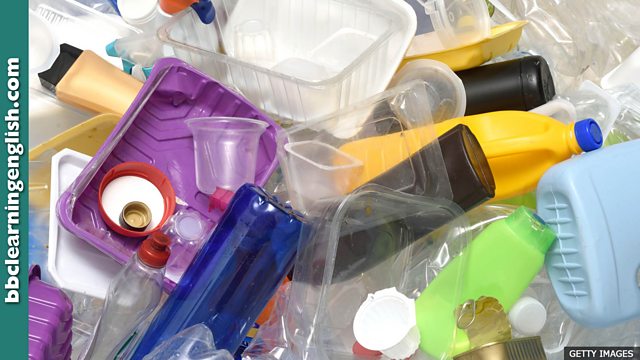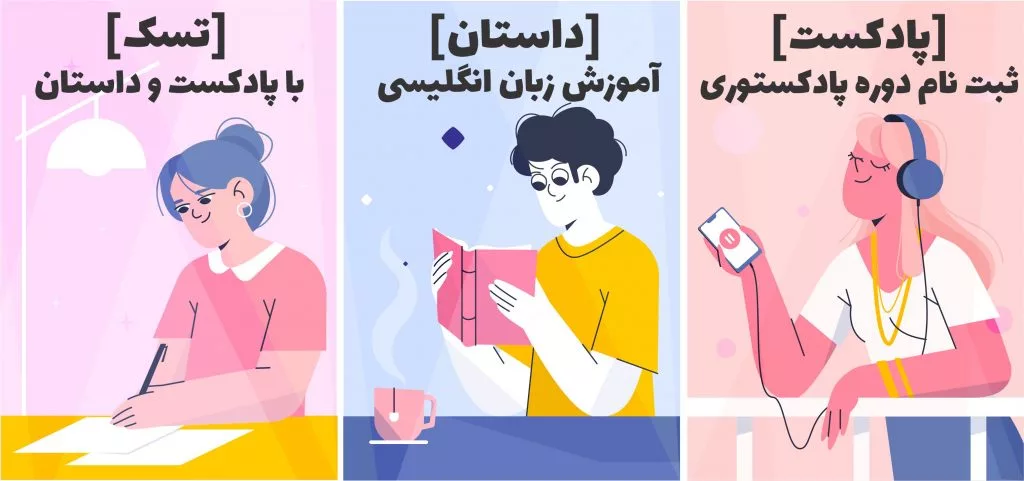پادکست انگلیسی BBC – مصرف پلاستیک
در پادکست انگلیسی BBC – مصرف پلاستیک ، درباره بحران مصرف بی رویه پلاستیک صحبت میشه. فرهنگ این که کمتر از پلاستیکها استفاده کنیم و به جای آن مثلا برای خرید نان از کیسه پارچهای استفاده کنیم یکی از کمپینهای روز دنیاست اما چرا هر چقدر که گروههای مختلف تلاش میکنند باز هم مردم بسیاری از پلاستیکها استفاده میکنند. به نظر میرسد مردم به پلاستیکها اعتیاد پیدا کردهاند.
سوال پادکست انگلیسی BBC – مصرف پلاستیک :
The first synthetic plastic – that’s plastic made entirely from man-made materials – was created over 100 years ago. Do you know what its brand name was? Was it…
a) Bakelite
b) Lucite
c) Formica
به پادکست خوب گوش کن تا جواب رو پیدا کنی.
اگر می خوای گوش دادن به پادکست تا حد امکان برات ساده و کارآمد باشه مراحل زیر را دنبال کن:
هر روز به پادکست گوش کن. وقتی براش یه وقت ثابت در روز در نظر بگیری برات تبدیل به عادت میشه و این عادت هرروز پیشرفت میکنه.
پادکستی رو پیدا کن که موضوعش برات جالب باشه. وقتی از خود موضوع لذت ببری یادگیری هم برات لذتبخش میشه.
به پادکستی گوش کن که transcript یا متن داره. این بهت کمک می کنه تا کلمات و عبارات جدید رو به سرعت در متن پیدا کنی و ساختار انواع مختلف جمله رو خوب یاد بگیری.
پس از گوش دادن به پادکست با متن، در مرحله بعدی سعی کن بدون نگاه کردن به متن این کار رو انجام بدی. این کار مهارت شنیداری رو تقویت می کنه و کمک می کنه تا انگلیسی زبانان بومی را راحت تر درک کنی، حتی اگر خیلی سریع صحبت کنن.
اگه به پادکست انگلیسی گوش کردی و نتونستی کامل متوجه اش بشی، ناامید نشو. پادکست هایESL -English as Second Language بیشماری وجود دارن که برای سطوح مختلف، از ابتدایی تا پیشرفته طراحی شدن. مطمئنا هر روز می تونین یه پادکست مناسب با سطح خودت پیدا کنی.
فراموش نکن که هرچی بیشتر تمرین کنی در اون مهارت رشد میکنی! به قول انگلیسی ها: Practice makes perfect
واژگان کلیدی پادکست انگلیسی BBC - مصرف پلاستیک
| معنی به فارسی | معنی به انگلیسی | واژه |
| فروپاشی | the natural process of something being destroyed or breaking down into small particles | decay |
| تجزیه پذیر | something that can decay naturally without harming anything | biodegradable |
| روانشناسی | something that affects or involves our mind | psychological |
| اختلاف نظر بین دو ایده مخالف | disagreement between two opposing ideas | dissonance |
| اقدام برای تغییر چیزی که می تواند یک تغییر اجتماعی یا سیاسی یا تغییر در رفتار یا نگرش ما باشد | taking action to change something – it could be social or political change, or a change in our behaviour or attitude | activism |
| مطالبه اجتماعی | people are strongly encouraged or persuaded to do something, usefully by force | a big push |
BBC 6 minute English -Curbing our plastic addiction

برای دانلود پادکست روی سه نقطه سمت راست کلیک و گزینه Download را انتخاب کنید.
متن پادکست انگلیسی BBC - مصرف پلاستیک
Neil
Hello, and welcome to 6 Minute English. I'm Neil.
Rob
And hello, I'm Rob.
Neil
Today we're talking about plastic.
Rob
Yes, it's our addiction to plastic that is of concern because this material doesn't decay very quickly, so once we've used it, it hangs around for a very long time.
Neil
It is a problem – and decay, by the way, describes the natural process of something being destroyed or breaking down into small particles. We hear so much about the consequences of having too much waste plastic around, don't we?
Rob
Indeed. Not only does it cause a mess - wildlife, particularly marine animals, are at risk when they become entangled in plastic waste, or ingest it. It's an issue that needs tackling – or dealing with. And that's what we'll be discussing today and finding out what could be done to solve this plastic crisis.
Neil
OK, first, let's challenge you to answer a question about plastic, Rob. The first synthetic plastic – that's plastic made entirely from man-made materials - was created over 100 years ago. Do you know what its brand name was? Was it…
a) Bakelite,
b) Lucite or
c) Formica?
Rob
I'm no expert, so I'll say c) Formica.
Neil
Well, we'll reveal the answer at the end of the programme. Now let's talk more about plastic. This man-made substance is everywhere - from clothing to crisp packets, and bottles to buckets.
Rob
But the problem is that most of it isn't biodegradable – that's a word that describes something that can decay naturally without harming anything. Each year, 400 million tonnes of plastic is produced and 40% of that is single-use. So why don't we stop using it?
Neil
It's not that easy, Rob, and it's something Lucy Siegle, a BBC reporter and author, has been talking about. She was speaking in a discussion on the Costing the Earth programme on BBC Radio 4, and explained the issue we have with quitting plastic but also how our attitude is changing…
Lucy Siegle, BBC reporter and author
We have this weird psychological attachment to this material that's been around and it's like a push and pull. At the one time, we're so horrified by what we're seeing – the whales dying, the oceans vomiting plastic, beaming in from all over the world, and at the same time we're being told we can't live without it, so that creates a psychological dissonance –which I think is the barrier to behavioural change but I'm finding now awareness has peaked and it's going over into activism.
Rob
She mentioned the word psychological – that's something that affects or involves our mind – so here, psychological attachment means that in our mind we feel we have to use plastic – we're addicted.
Neil
But we also see the negative impact of plastic – like whales dying – and in our mind we're also thinking we must stop! This has created what Lucy says is a 'psychological dissonance' - dissonance means a disagreement between two opposing ideas – so we're having an argument in our head about the right thing to do – this is the 'push and pull' of thoughts she referred to.
Rob
And this dissonance has been the barrier to us trying to solve the plastic issue – but now we're starting to do something about it – we're taking action to reduce our plastic waste – we're turning to activism. That's taking action to change something – it could be social or political change, or a change in our behaviour or attitude.
Neil
Of course there has been a big push – that means people have been strongly encouraged – to recycle.
Rob
Maybe in an ideal world the best thing to do is go plastic-free – but that isn't easy, is it?
Neil
No, it isn't, and it's something Lucy Siegle spoke about. Getting rid of plastic in our lives is a gradual process. But where does she think we can make the biggest difference?
Lucy Siegle, BBC reporter and author
I really think that to concentrate on stopping the flow of plastics into your life is easier and more effective in the long term, than trying to go plastic-free from the outset. We are in the UK, a supermarket culture, so a lot of the tips and tricks to decreasing the flow of plastic are getting round supermarket culture.
Rob
She says we have a supermarket culture in the UK. Culture here describes a way of life – or a way that we generally behave – and in terms of food shopping, we tend to do that in supermarkets.
Neil
So, for example, customers can make a big difference by putting pressure on supermarkets to use less plastic packaging. It does seem that the future of plastic is in our hands – we need to be more careful about how and when we use it – and use our collective power to force change if it's needed.
Rob
But there's no doubt plastic is useful for many things so it will be a long time before it disappears altogether.
Neil
And earlier I asked you what was the name of the first synthetic plastic, invented over a 100 years ago. Was it…
a) Bakelite,
b) Lucite or
c) Formica?
Rob
And I said c) Formica. Was I right?
Neil
Formica is a type of hard plastic used for covering tables and working areas in kitchens – but it's not the oldest type. That was Bakelite.
Rob
I may have got that wrong but hopefully I'll have more success recapping some of today's vocabulary – starting with decay, which describes the natural process of something being destroyed or breaking down into small particles – which plastic takes a long time to do.
Neil
Next we had biodegradable – that's a word to describe something that can decay naturally without harming anything.
Rob
Then we had psychological – that's something that affects or involves your mind.
Neil
Next up, we had dissonance, which describes a disagreement between two opposing ideas.
Rob
And then we mentioned activism - that's taking action to change something. We also mentioned the phrase a big push which means people are strongly encouraged or persuaded to do something, usefully by force.
Neil
And finally we had culture. In our context of supermarket culture, it describes a way of life – or a way that we generally behave.
Rob
Thanks, Neil. Now, remember you can find more learning English programmes and materials on our website at bbclearningenglish.com. That's it for now but please join us next time for 6 Minute English. Goodbye.
Neil
Goodbye.
امیدوارم از پادکست انگلیسی BBC - مصرف پلاستیک در سقوط لذت برده باشید.
گوش دادن به پادکست روش خوبی برای تقویت مهارت شنیداری و هم چنین یادگرفتن کلمات در بستر یک موضوع خاصه که این به تقویت مهارت مکالمه انگلیسی نیز کمک زیادی می کنه.
اگه تو هم از اون آدمهایی هستی که از گوش دادن به پادکست لذت می بره برات یه خبر خوب دارم! آموزشگاه زبان انگلیسی 24talk یه دوره طراحی کرده مبتنی بر پادکست و داستان کوتاه به اسم "پادکستوری - Podcastory". این دوره سعی کرده یادگیری زبان انگلیسی رو مناسب با نیاز و سطح زبان آموز به یه فرایند بسیار مفرح، موثر، سریع و کم هزینه تبدیل کنه.
همین الان می تونی با کلیک روی عکس زیر و ثبت نام در دوره ی آموزش زبان انگلیسی با پادکست و داستان ۲۴talk اولین و مهم ترین قدم رو برای یادگیری زبان انگلیسی برداری. وقت رو از دست نده!
دوره پادکستوری آکادمی مجازی 24talk
برای شنیدن دیگر پادکست ها، به بخش پادکست در مرکز آموزش رایگان مراجعه نمایید.









